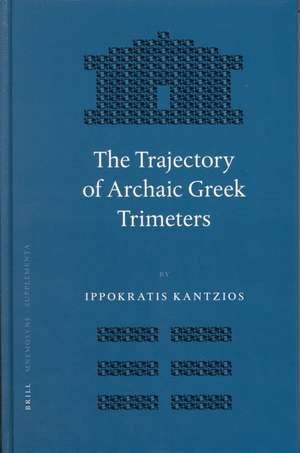The Trajectory of Archaic Greek Trimeters: Mnemosyne, Supplements, cartea 265
Autor Ippokratis Kantziosen Limba Engleză Hardback – 23 mai 2005
The various chapters examine the subject matter, morphology, and diction of the trimeters both within the genre in a diachronic fashion and in relation to elegy. The metrical inscriptions and later iambic poetry are also considered, as the author ponders the rise of tragedy and the disappearance of serious iambus.
This work is of interest not only to scholars of archaic lyric poetry but also of tragedy and sympotic practices.
Din seria Mnemosyne, Supplements
-
 Preț: 370.60 lei
Preț: 370.60 lei - 18%
 Preț: 1470.11 lei
Preț: 1470.11 lei - 18%
 Preț: 1598.51 lei
Preț: 1598.51 lei - 18%
 Preț: 735.03 lei
Preț: 735.03 lei - 18%
 Preț: 701.25 lei
Preț: 701.25 lei -
 Preț: 268.14 lei
Preț: 268.14 lei -
 Preț: 90.66 lei
Preț: 90.66 lei - 18%
 Preț: 584.02 lei
Preț: 584.02 lei -
 Preț: 169.79 lei
Preț: 169.79 lei -
 Preț: 216.33 lei
Preț: 216.33 lei - 18%
 Preț: 585.26 lei
Preț: 585.26 lei - 18%
 Preț: 581.91 lei
Preț: 581.91 lei - 18%
 Preț: 729.55 lei
Preț: 729.55 lei - 18%
 Preț: 657.49 lei
Preț: 657.49 lei - 15%
 Preț: 412.41 lei
Preț: 412.41 lei - 18%
 Preț: 708.10 lei
Preț: 708.10 lei - 18%
 Preț: 731.10 lei
Preț: 731.10 lei -
 Preț: 270.76 lei
Preț: 270.76 lei - 18%
 Preț: 730.73 lei
Preț: 730.73 lei - 18%
 Preț: 733.06 lei
Preț: 733.06 lei - 18%
 Preț: 586.34 lei
Preț: 586.34 lei - 18%
 Preț: 731.88 lei
Preț: 731.88 lei - 18%
 Preț: 586.18 lei
Preț: 586.18 lei - 18%
 Preț: 1544.99 lei
Preț: 1544.99 lei - 18%
 Preț: 731.65 lei
Preț: 731.65 lei - 18%
 Preț: 732.03 lei
Preț: 732.03 lei - 18%
 Preț: 972.54 lei
Preț: 972.54 lei - 18%
 Preț: 585.95 lei
Preț: 585.95 lei -
 Preț: 380.61 lei
Preț: 380.61 lei - 18%
 Preț: 718.31 lei
Preț: 718.31 lei - 18%
 Preț: 732.21 lei
Preț: 732.21 lei - 18%
 Preț: 586.26 lei
Preț: 586.26 lei - 18%
 Preț: 731.59 lei
Preț: 731.59 lei - 18%
 Preț: 1257.68 lei
Preț: 1257.68 lei - 18%
 Preț: 970.27 lei
Preț: 970.27 lei - 18%
 Preț: 557.30 lei
Preț: 557.30 lei - 18%
 Preț: 847.32 lei
Preț: 847.32 lei - 18%
 Preț: 732.44 lei
Preț: 732.44 lei - 18%
 Preț: 731.80 lei
Preț: 731.80 lei -
 Preț: 355.16 lei
Preț: 355.16 lei - 18%
 Preț: 588.14 lei
Preț: 588.14 lei - 18%
 Preț: 1211.56 lei
Preț: 1211.56 lei - 18%
 Preț: 586.11 lei
Preț: 586.11 lei - 18%
 Preț: 732.83 lei
Preț: 732.83 lei - 18%
 Preț: 732.35 lei
Preț: 732.35 lei - 18%
 Preț: 1484.13 lei
Preț: 1484.13 lei - 18%
 Preț: 731.59 lei
Preț: 731.59 lei - 18%
 Preț: 730.63 lei
Preț: 730.63 lei - 18%
 Preț: 732.03 lei
Preț: 732.03 lei - 18%
 Preț: 970.21 lei
Preț: 970.21 lei
Preț: 878.88 lei
Preț vechi: 1071.81 lei
-18% Nou
Puncte Express: 1318
Preț estimativ în valută:
168.18€ • 179.84$ • 140.22£
168.18€ • 179.84$ • 140.22£
Carte indisponibilă temporar
Doresc să fiu notificat când acest titlu va fi disponibil:
Se trimite...
Preluare comenzi: 021 569.72.76
Specificații
ISBN-13: 9789004145368
ISBN-10: 9004145362
Pagini: 208
Dimensiuni: 155 x 235 x 20 mm
Greutate: 0.55 kg
Editura: Brill
Colecția Brill
Seria Mnemosyne, Supplements
ISBN-10: 9004145362
Pagini: 208
Dimensiuni: 155 x 235 x 20 mm
Greutate: 0.55 kg
Editura: Brill
Colecția Brill
Seria Mnemosyne, Supplements
Public țintă
All those interested in the history and development of archaic iambus and elegy, in later iambic poetry, and in the origins of tragedy, as well as in the performative and social aspects of the symposium.Notă biografică
Ippokratis Kantzios, Ph.D. (1996) in Greek, Bryn Mawr College, is an Assistant Professor of Greek Language and Literature at the University of South Florida. He has published primarily on early Greek poetry, but also on Aeschylus and Theocritus.
Recenzii
'K's research is a very accurate and valuable investigation and collection of data -- which remains available for further assessment and application -- to be read by every scholar interested in the history of poetic forms.'
Liana Lomiento, BCMR, 2006
Liana Lomiento, BCMR, 2006
